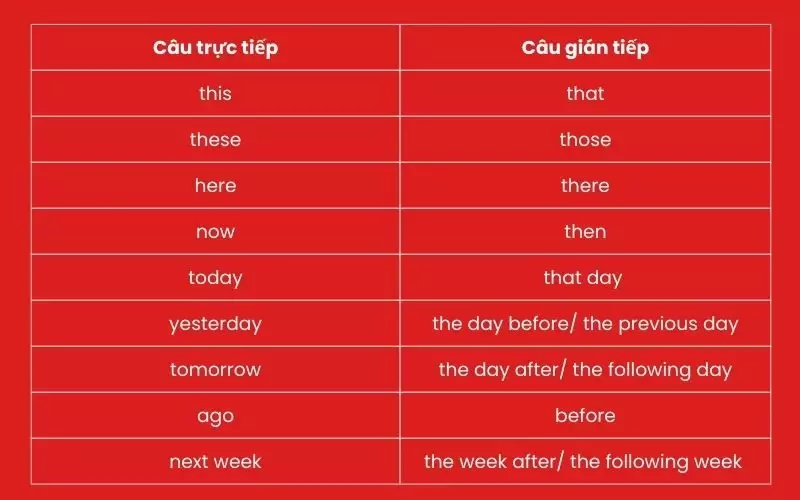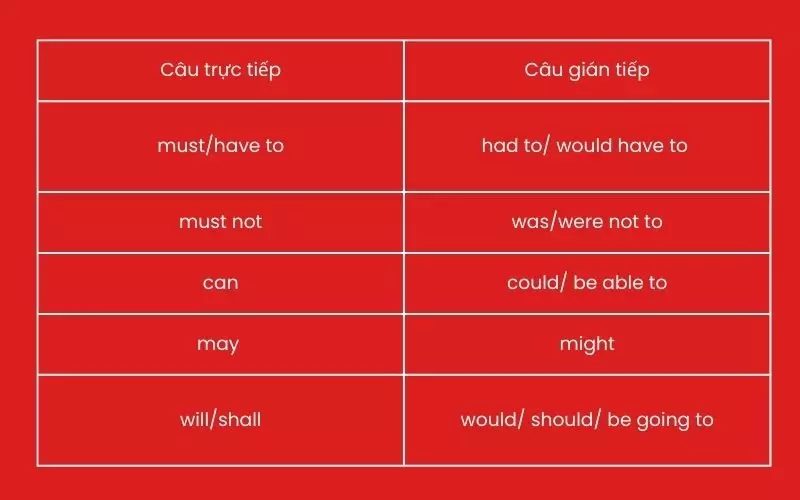Trong tiếng Anh, cấu trúc câu gián tiếp và câu trực tiếp là hai khái niệm căn bản và quan trọng mà bạn cần nhớ. Trên hết, hãy hiểu rõ về hai cấu trúc này và cách chuyển đổi từ câu trực tiếp sang câu gián tiếp một cách chính xác nhất. Hãy cùng tìm hiểu ngay!
1. Cấu trúc câu trực tiếp là gì? Cấu trúc câu gián tiếp là gì?
Đầu tiên, hãy tìm hiểu về cấu trúc câu trực tiếp và câu gián tiếp.
Cấu trúc câu trực tiếp (direct speech): Đây là câu nói chính xác theo lời của một người diễn đạt. Nó còn được gọi là câu trích dẫn. Cấu trúc câu trực tiếp bao gồm "mệnh đề tường thuật" + "mệnh đề được tường thuật lại". Mệnh đề được tường thuật lại được đặt trong dấu ngoặc kép để nhắc lại chính xác câu từ của người nói.
Ví dụ: Anh ấy nói: "I went to school yesterday" -> Anh ấy nói là hôm qua anh ấy đi học.
Cấu trúc câu gián tiếp (indirect speech): Đây là cách diễn đạt lại câu nói của một người khác dưới dạng câu gián tiếp. Cấu trúc câu gián tiếp không sử dụng dấu ngoặc kép và có sự biến đổi về thì của câu. Cấu trúc câu gián tiếp bao gồm "mệnh đề tường thuật" + "that" + "mệnh đề được tường thuật lại". Câu gián tiếp được thêm từ "that" để nối hai vế câu lại với nhau.
Ví dụ: Mary nói rằng cô ấy đang đói bụng -> Mary said that she is hungry now.
 Hình ảnh minh họa
Hình ảnh minh họa
2. Quy tắc chuyển cấu trúc câu trực tiếp sang cấu trúc câu gián tiếp
Để diễn đạt ý của người nói một cách chính xác, chúng ta cần lưu ý những quy tắc cơ bản sau khi chuyển cấu trúc câu trực tiếp sang câu gián tiếp:
2.1 Trường hợp 1: Động từ ở mệnh đề chính là thì hiện tại đơn, hiện tại hoàn thành hoặc tương lai đơn
Trong trường hợp này, chúng ta chỉ cần đổi đại từ và chia động từ tương ứng với đại từ đó.
Ví dụ:
- Anh ấy nói: "I hope it will rain tomorrow" -> Anh ấy nói rằng anh ấy hy vọng rằng sẽ có mưa ngày mai.
- Mira nói: "I am sad now" -> Mira nói rằng cô ấy đang buồn.
 Hình ảnh minh họa
Hình ảnh minh họa
2.2 Trường hợp 2: Động từ trong mệnh đề chính là quá khứ đơn
Trong trường hợp này, chúng ta cần đổi thì, đổi đại từ và một số cụm từ chỉ thời gian, nơi chốn. Đồng thời, khi chuyển từ câu trực tiếp sang câu gián tiếp , cần lưu ý những thay đổi sau:
- Biến đổi thì động từ
- Thay đổi giới từ và trạng từ của câu
 Hình ảnh minh họa
Hình ảnh minh họa
Trường hợp đặc biệt, nếu câu trực tiếp diễn tả một thói quen hoặc một sự thật hiển nhiên, chúng ta có thể sử dụng hiện tại đơn thay vì quá khứ đơn trong câu gián tiếp.
Ví dụ: Anh ấy nói: "I go to bed late every evening" -> Anh ấy nói rằng anh ấy đi ngủ muộn mỗi tối.
Đối với những động từ khiếm khuyết (modal verbs), ta có thể sử dụng những động từ cùng nghĩa khi chuyển từ câu trực tiếp sang câu gián tiếp.
 Hình ảnh minh họa
Hình ảnh minh họa
3. Các cách chuyển đổi câu trực tiếp sang câu gián tiếp
Chuyển đổi câu trực tiếp sang câu gián tiếp thường sẽ có 4 loại câu: câu mệnh lệnh/yêu cầu, câu hỏi, câu cảm thán và câu trần thuật.
3.1 Cấu trúc câu gián tiếp dạng mệnh lệnh/yêu cầu
Câu mệnh lệnh/yêu cầu thường sử dụng các động từ như: order, command, tell, ask, request, require,...
Cách chuyển: Câu trực tiếp: S + tell/request/require/... + O + to-infinitive -> Câu gián tiếp: S + told/requested/ required + O + not to-infinitive.
Ví dụ: "Hurry up", giáo viên nói với họ -> Giáo viên yêu cầu họ vội vàng.
3.2 Câu gián tiếp dạng câu hỏi
Về câu hỏi, chúng ta có 2 dạng là câu hỏi yes-no và câu hỏi Wh.
Câu hỏi yes-no: Cấu trúc - S+ asked/inquired/wondered, wanted to know + if/whether +S +V.
Ví dụ: "Have you watched that film?" -> Anh ấy hỏi xem tôi có xem bộ phim đó chưa.
Câu hỏi Wh (who, what, where, when): Cấu trúc - S + asked(+O)/wanted to know/required/wondered + Wh-words + S + V.
Ví dụ: What time does the class begin? -> Cô ấy muốn biết lúc nào lớp học bắt đầu.
3.3 Câu gián tiếp dạng câu cảm thán
Cấu trúc - S+ said/told/exclaimed + that + S + V(lùi thì) + O.
Ví dụ: What a lovely house they have! -> Cô ấy nói rằng ngôi nhà của họ thật đẹp.
3.4 Câu gián tiếp dạng trần thuật
Cấu trúc - S + say(s)/said + that + S + V.
Ví dụ: I saw him yesterday -> Cô ấy nói rằng cô ấy đã gặp anh ấy hôm qua.
 Hình ảnh minh họa
Hình ảnh minh họa
3.5 Những trường hợp đặc biệt của câu gián tiếp
Khi chuyển câu trực tiếp sang câu gián tiếp, chúng ta không đổi thì ở mệnh đề phụ trong các trường hợp đặc biệt sau:
- Động từ trong câu trực tiếp có thời gian cụ thể.
- câu điều kiện loại 2 và 3 .
- Quá khứ giả định.
- Câu trực tiếp có chứa could, should, might, used to, ought to, would rather, had better,...
- Câu trực tiếp diễn tả một chân lý, một tình huống không đổi.
 Hình ảnh minh họa
Hình ảnh minh họa
4. Bài tập về câu trực tiếp, gián tiếp trong tiếng Anh
4.1 Bài tập
Bài tập 1: Chuyển các câu sau từ câu trực tiếp sang gián tiếp .
- "Where's my book?" Linh asked.
- "Where are you going?" Lan asked us.
- My brother asked: "Have I cleaned the room?"
- "Where have you been?" the mother asked her daughter.
- "What color shirt do you like the most?" I asked my boyfriend.
- "What are they doing?" My father asked.
- "Will she go to the movies?" My brother asked Lan.
- The teacher asked: "Did the whole class do the English homework?"
- "Why did you lie?" she asked me.
- "Have you talked to your family?" my friend asked me.
Bài tập 2: Chọn đáp án đúng.
-
“How old are you?” he asked. A. He asked me how old are you. B. He asked me how old I am. C. He asked me how old was I. D. He asked me how old I was.
-
My mother asked me: “Where are you going?” A. My mother asked me where was I going. B. My mother asked me where I was going. C. My mother asked me where is I going. D. My mother asked me where I is going.
-
“Keep silent,” said the teacher to the kids. A. The teacher told the kids to keep silent. B. The teacher said the kids to keep silent. C. The teacher told the kids keep silent. D. The teacher told to the kids to keep silent.
-
“I didn't see my family last week,” Linh said. A. Linh said he didn’t see my family last week before. B. Linh said he hasn’t seen my family last week. C. Linh said he hadn’t seen my family last week. D. Linh said he hadn’t seen my family last week before.
-
“We are ready for the next event,” they said to us. A. They told us they are ready for the next event. B. They told us they will ready for the next event. C. They told us we were ready for the next event. D. They told us they were ready for the next event.
-
“I have finished the project,” Linh said to me. A. Linh told me she has finished the project. B. Linh told me she finished the project. C. Linh told me she had finished the project. D. Linh told me she has been finished the project.
-
“Please bring me the menu,” he said to the waitress. A. He asked the waitress bring him the menu. B. He asked the waitress to bring her the menu. C. He asked the waitress to bring him the menu. D. He asked the waitress bring her the menu.
-
“Don’t shout,” she said to me. A. She told me don’t shout. B. She told to me not to shout. C. She told me not to shout. D. She said to me don’t shout.
-
“I cleaned the house yesterday,” she said. A. She told me she had cleaned the house the day before. B. She said to me I cleaned the house the day before. C. She told me she had cleaned the house yesterday. D. She told me she cleaned the house yesterday.
-
“Can you lend me the book?” he asked me. A. He asked me can you lend him the book. B. He asked me could you lend him the book. C. He asked me if I can lend him the book. D. He asked me if I could lend him the book.
Bài tập 3: Chọn đáp án đúng.
-
Linh asked me _____. A. Where do you come from? B. where I came from C. where I come from D. where did I come from?
-
She asked me _____ I liked Korean music. A. when B. what C. if D. x
-
The doctor ____ him to drink 2 liters of water. A. told B. tell C. have told D. are telling
-
My brother wanted to know_____ complete this project. A. when would she B. when will she C. when she will D. when she would
-
Linh told me that her father____ a luxury car. A. owns B. owned C. owning D. A and B
-
What did that man say __? A. at you B. for you C. to you D. you
-
I called my friend in America last night, and she said it ___ sunny there. A. is B. were C. has been D. was
-
The architects have __ that the house blueprint will be completed on time. A. promised B. promise C. promises D. promising
-
The doctor ___ him to take more exercise. A. told B. tell C. have told D. are telling
-
The last time I saw my mother she looked very happy. She explained she’d been on holiday the __ week. A. ago B. following C. next D. previous
-
Last week, Lan __ she put the key on the cupboard. A. asked B. is asking C. ask D. was asked
-
My sister has __ this answer wasn’t completely true. A. admitting that B. was admitted that C. admitted that D. admit that
-
When I called my brother yesterday, he said he was busy __ days. A. that B. the C. then D. this
-
My mother wonders _____ the clothes are on sale yet. A. what B. when C. where D. whether
-
Linh _____ me that my train was about to leave. A. has reminded B. has reminded that C. reminded D. reminded that
-
Hello, Lan. I didn’t expect to see you today. John said you _____ ill. A. are B. were C. was D. should be
-
Lan __ and left. A. said goodbye to me B. says goodbye to me C. tell me goodbye D. told me goodbye
-
I told you __ switch off the light, didn’t I? A. don’t B. not C. not to D. to not
-
Lan was slow, so her brother ____ hurry up. A. tell him B. told him for C. told to D. told him to
-
Lan was driving too fast, so I __ to slow down. A. asked her B. asked C. ask D. have asked her
Bài tập 4: Viết lại câu.
-
“You stole my best watch, Linh!” John said.
- John accused Linh of stealing his best watch.
-
“You broke my phone, John!” Lan said.
- Lan accused John of damaging her phone.
-
“Where was your baby girl born?” the nurse said to Mrs. Lan.
- The nurse asked Mrs. Lan where her little daughter was born.
-
“Brother John, you should drink 2 liters of water a day,” said the doctor.
- The doctor advised Mr. John to drink enough 2 liters of water every day.
-
“Will I be able to find this homestay?” Lan said to herself.
- Lan wonders if she could find this homestay.
-
“I'm sorry I lied to you,” Lan told Susan.
- Lan apologizes to Susan for lying to her.
-
“When do you get your summer vacation?” Lan asked.
- Lan asked Linh when he would start his summer vacation.
-
“Can I have a new pair of shoes, please?” I told her mother.
- I asked her mother if she could get a new pair of shoes.
-
“Don't hang out until I get back, Peter,” his mother said.
- Peter's mother told him not to go out until she got back.
-
“Don't touch the knife,” Mrs. James told her son.
- Mrs. James told her son not to touch knives.
Bài tập 5: Viết lại câu mà nghĩa không đổi.
-
“If the weather is nice, I will go on a picnic with my family,” he said.
- He said if the weather is nice, he will go on a picnic with his family.
-
“What would you do if you had five days off?” I asked him.
- I asked him what he would do if he had (have) five days off.
-
“I would come to see you if I didn't have to take the exam, James,” she said.
- She said she would come to see James if she didn't have to take the exam.
-
"I'm sure I won't be jealous if you tell me the truth," he told me.
- He told me he was sure he wouldn't be jealous if I told him the truth.
-
“If there's a storm tomorrow, we won't have to go to school,” they told me.
- They told me that if there's a storm tomorrow, we won't have to go to school.
-
She told me: “If I were you, I wouldn't choose to give up this dream job.”
- She told me that if she were me, she wouldn't choose to give up this dream job.
-
“If a lot of guests come, the homestay will be full.”
- "The receptionist told us that if many guests come, the homestay will be full."
-
“You will be surprised if you meet her,” Linh told Linda.
- Linh told Linda that she will be very surprised if she meets you.
-
She said: “I will get sick if I stay out in the sun for too long.”
- She said she would get sick if she stayed out in the sun for too long.
-
“What would you do if you saw him?” Linh asked me.
- Linh asked me what I would do if I met him.
Hy vọng qua bài viết này, bạn đã có kiến thức cơ bản về cấu trúc câu gián tiếp trong tiếng anh và có thể áp dụng nó vào việc viết và giao tiếp hàng ngày. Hãy luyện tập thường xuyên để ghi nhớ và làm quen với những quy tắc và cấu trúc này.
ĐĂNG KÝ NGAY:
- Đăng ký TEST ONLINE MIỄN PHÍ
- khóa học tiếng anh giao tiếp OFFLINE
- Khóa học tiếng Anh giao tiếp TRỰC TUYẾN NHÓM
- Khóa học tiếng Anh giao tiếp 1 kèm 1

















